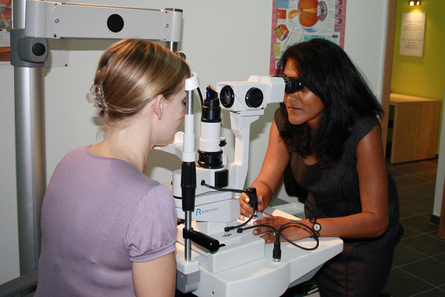Eye Examination
Do I need an eye test ?
Many people think it is important to visit the hair dressers regularly, get their cats or dogs vaccinated annually and have a twice yearly check up with the dentist. But not quite so many of us get round to having an eye test unless we have real problems with our sight. Eye tests are not just about whether you need to wear glasses or not, they also provide a primary health check and can sometimes be the first point of contact in detecting associated diseases and conditions such as cataracts, glaucoma, diabetes and macular degeneration.
The General Optical Council (UK) recommend that adults should have their eyes checked every two years and children under 16 yearly. If these recommendations are ignored, and unfortunately they often are, this could mean that more people than need to, are putting up with vision problems that can make everyday tasks much more difficult and even dangerous. Others may have serious eye problems that go undiagnosed.
Surali Shah-Neville BSc. (hons.), Ophthalmic Director at SN&N Optico takes us step by step through the eye examination process and helps to dispel any myths along the way.
The pre-test
Initially you will be asked to complete a simple questionnaire regarding your general health and family history relating to your family’s health. You will then be taken for the “pre-test” by an Optical Assistant. This consists of 2 tests. The first is carried out on an instrument called an auto refractor which measures the curvature of your corneas (front part of the eye), the distance between your eyes and an estimate of your prescription. The second test is carried out on an instrument called a non-contact tonometer and measures your eye pressures by blowing a gentle puff of air onto the front of the eye. An increase in pressure may be a sign of glaucoma. The results of both these tests are then passed on to the optometrist.
The eye examination
The Optometrist (the person who will examine your eyes) will then take you through to the consulting room. You will then be asked the reason for your visit to the opticians and they will assess what symptoms, if any, you may have. You will also be asked your general health which will include any medication you may be taking and whether you or your family have any history of eye problems such as glaucoma.
The main part of the eye examination is to check how clearly you can see. Measurements are taken of your vision without wearing glasses or contact lenses and the optometrist then uses an instrument called a retinoscope to work out your prescription. A trial frame will then be placed on you and a series of different strength lenses will be passed through the frame to fine tune your correct measurements. Tests are also carried out to ensure that both eyes work together and that the eye muscles are balanced.
Once the visual test is completed, the health of your eyes will be examined. Using an instrument called an ophthalmoscope, a light is shone through the pupil (the dark centre of your eye) so that the optometrist can see the inner part of your eye and you will be asked to look in different directions. Another instrument called a slit lamp bio microscope is used to examine the external part of your eye.
When the examination is complete, the optometrist will discuss the results with you and advise whether you need to wear glasses or not or whether your existing prescription needs updating. You may be referred to a specialist if further treatment for an eye condition is necessary. You will also be advised when you should have your next eye examination. Finally you will be given a copy of your prescription.
To see if you need an eye test, see if you answer yes to any of the questions below:
- Do you find yourself squinting at the TV?
- Do you find yourself holding the newspaper further away?
- Do you suffer from headaches if doing close work?
- Is it at least 2 years since your last eye test?
- Do you ever get blurred or double vision?
- Do your eyes water and are they often red?
Surali goes on to explain that a visit to the opticians is a truly painless experience, “We have some patients that come to see us who are literally shaking with fear. We have a policy in the practice that the minute a patient walks through the door, all the staff are jointly responsible for helping to put them at ease. We promote a welcoming and friendly atmosphere and we inform our patients every step of the way. This allays any fears they may have. In my experience, a relaxed patient is a happy patient.”
Surali studied at University of Wales Institute of Science and Technology and qualified in 1988 with a Bachelor of Science degree in Optometry.
If you would like to see Surali for an eye test or just to discuss any concerns you may have, don’t hesitate to call her or her staff at SN&N Optico on 00351 282 761506 or email on info@snnoptico.com

